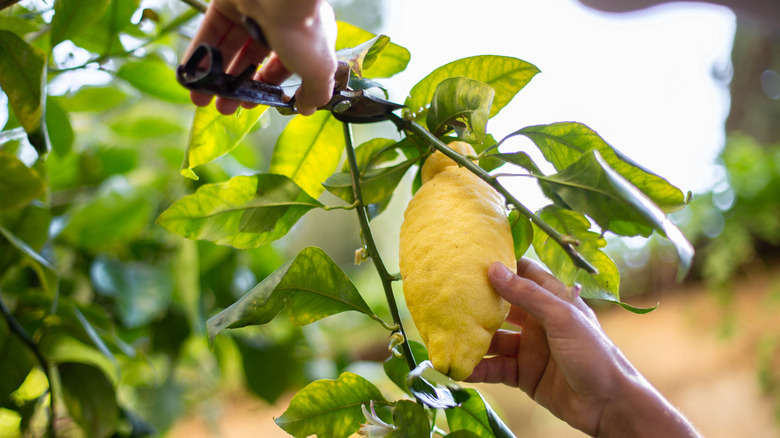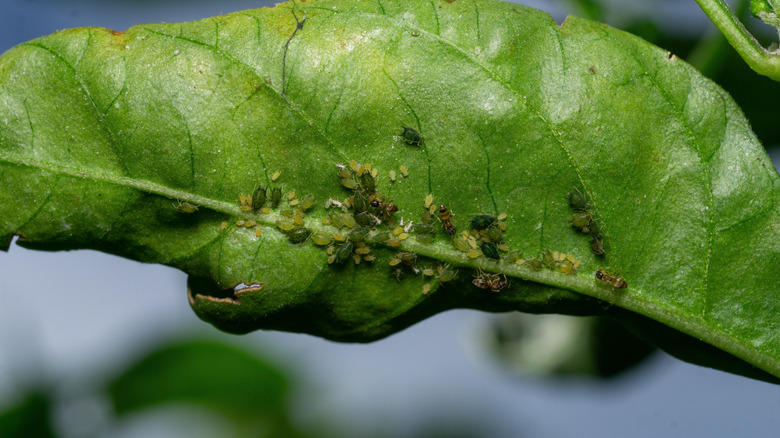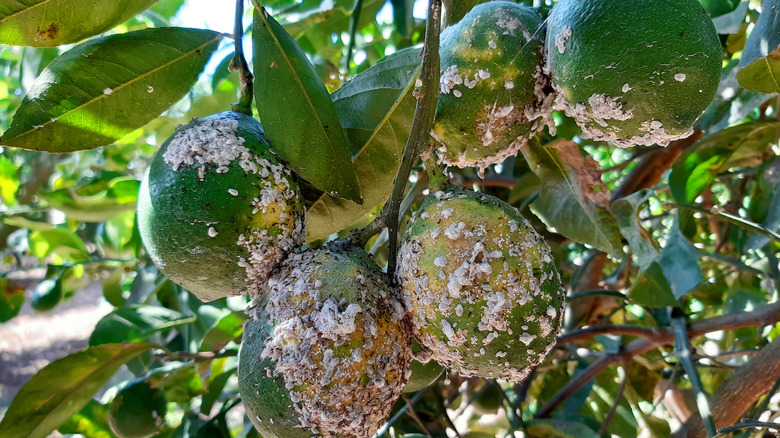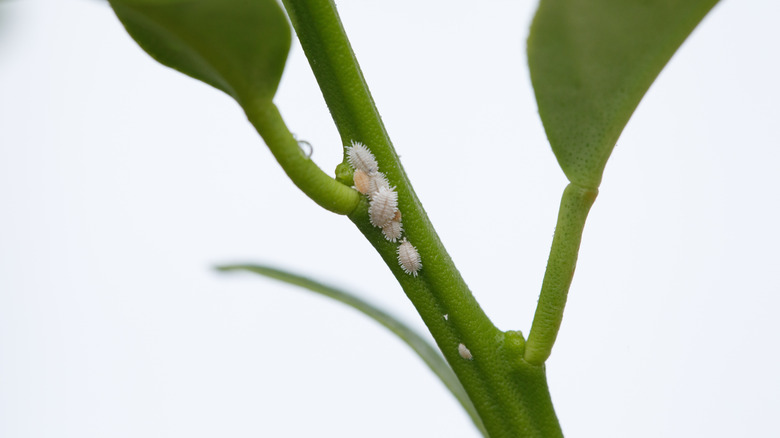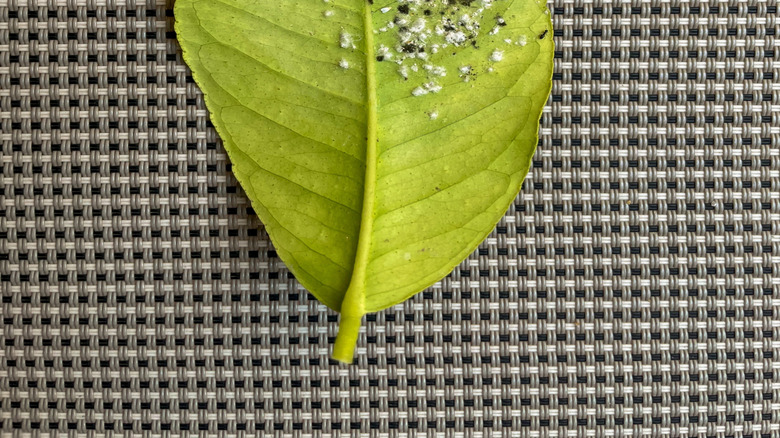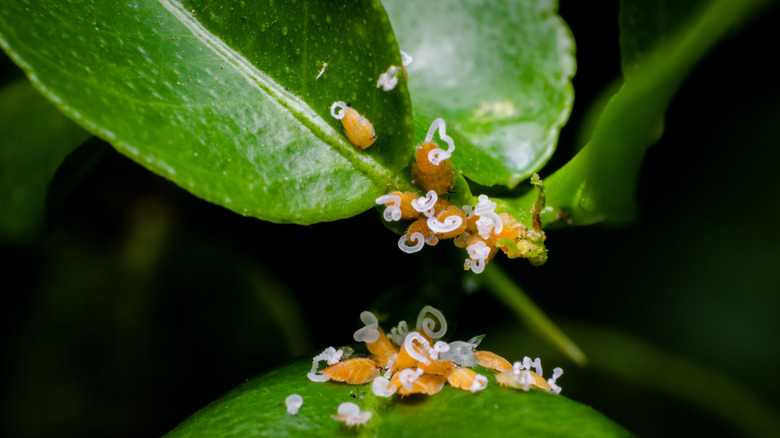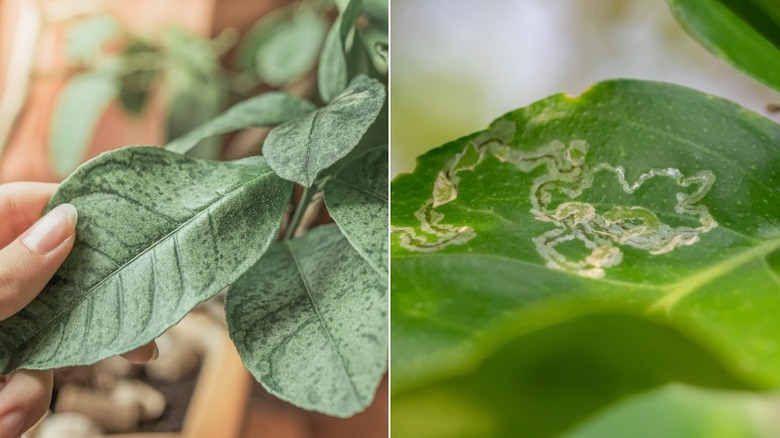Common Types Of Pests Attracted To Lemon Trees (& How To Protect Them)
Growing a lovely, healthy lemon tree that allows you to pick a ripe fruit whenever your recipe calls for it is not that difficult, but you'll find that some common types of pests are attracted to lemon trees. It's wise to familiarize yourself with these so you can keep an eye out for them and protect your tree from a total invasion. Most of these pests are sap suckers and can damage and weaken the foliage, while some will also make the fruit inedible. The most common pests you'll have to deal with are aphids, scale, mealybugs, whiteflies, psyllids, mites, and leaf miners.
The best way to protect your trees is to ensure they are in optimum health, are growing strongly, and have all the water and nutrients that they need. Of course, you want to control any pests that you see and endeavor to attract natural predators whenever possible. Try to avoid using chemical controls, as these will also harm the predatory insects you want to encourage into your garden. And, if you find that a lemon tree is struggling in your garden, you'll want to investigate the reasons for this.
Aphids
These soft-bodied insect pests love to feed on tender new growth. If left unchecked, you could end up with large colonies that will weaken and damage your juvenile lemon tree. Mature trees can usually handle this without causing a general decline, but younger trees could have their growth stunted. Another problem with insects such as aphids is that they secrete a sticky substance called honeydew. This will not only attract ants but also result in an unattractive black sooty mold covering the leaves.
One of the easiest ways to get rid of aphids is to spray them off with a strong jet of water from the hose. This works well if there are only small colonies present on your tree. The sooty mold does not harm the tree and can simply be wiped off with a damp cloth. Predators such as ladybugs, lacewings, and hoverflies are the most useful in controlling an aphid infestation. You'll also find that restricting the amount of nitrogen fertilizer in spring will limit the flush of new growth that's likely to attract these pests. By the time temperatures peak in summer, aphids will generally be in decline.
Scale insects
There are a variety of different types of scale insects that can infest your lemon trees, including California red scale, citrus snow scale, Florida red scale, purple scale, Florida wax scale, and cottony cushion scale. Most of these can be seen as dark or white bumps on stems and leaves. Like aphids, they are sap-suckers and also excrete the sticky honeydew. Large infestations can result in the leaves yellowing and dropping off the tree. They can cause the branches to die back and, in severe cases, even result in the death of your tree. Florida red scale and purple scale will also damage the fruits and make them inedible.
Beneficial insects to help reduce scale populations include parasitic wasps and ladybug beetles. For more immediate control, you can spray your lemon tree with horticultural or canola oil, which suffocates the pests. These products are very good at killing all the life stages of scale but, thanks to their minimal residual effect, they're not all that harmful to beneficial insects. It's best to apply these sprays late in the day to protect the foliage from damage. Repeat applications might be necessary to rid your tree of these pests, but remember to always follow the directions on the package.
Mealybugs
Mealybugs can be identified as white, cottony spots on the stems and leaves of your lemon tree. They're usually quite hidden, so you'll need to look for them on the undersides of the leaves and in crevices around fruit clusters. These insect pests also secrete honeydew. Their sap-sucking tendency will reduce the vigor of your tree and may cause fruit to drop before they have time to fully develop.
Thankfully, mealybugs have lots of natural predators like lady beetles, syrphid flies, and lacewings. There's also a beetle called the mealybug destroyer (Cryptolaemus montrouzieri) that's very good at controlling even large populations of these pests. This predatory insect looks a bit like a ladybug without the spots. To keep these beneficial insects happy, ensure you have plenty of nectar-rich flowers that they love and grow popular herbs that'll evict mealybugs from your garden, such as rosemary, thyme, and lavender.
Whiteflies
Another quite annoying pest for lemon tree growers is the whitefly. These are fairly easy to identify by shaking a branch and witnessing the tiny white flying insects as they fly off, often to land on a different branch. Whiteflies feed on the sap in the leaves and cause leaf discoloration and foliage death. They secrete huge amounts of sticky honeydew, resulting in black sooty mold. This in turn attracts ants, which won't damage your tree but are a good indication that you have a sap-sucking insect infestation.
One of the best ways to control these often large colonies of whiteflies is to hose them off and hang sticky yellow traps from the branches. These traps are particularly attractive to pests such as whiteflies. The insects will get stuck to the glue on the traps and die. Whiteflies also have predators such as ladybeetles and parasitic wasps. Additionally, horticultural and canola oil sprays can be effective against these pests. Plus, there are a variety of other ways to get rid of whiteflies and protect your lemon trees from an invasion, such as using neem oil or vacuuming them up.
Psyllids
The Asian citrus psyllid is a very damaging pest because it's the main way that the citrus greening disease is spread. This disease results in the twisting of leaves and often shortens the lifespan of trees that are infected. The deformed foliage is a result of the juveniles feeding on the new growth. These psyllids look very much like miniature cicadas and lay tiny yellow eggs that can be seen using a magnifying glass.
Asian citrus psyllids do have to be controlled using an insecticide to prevent the spread of the citrus greening disease. They are a federally regulated citrus pest, and their presence threatens the citrus industry as a whole. You can use yellow sticky traps to monitor the populations and check whether your control methods have been successful. Plus, there's a parasitic wasp introduced from Pakistan that provides very effective control, as seen in California, where it's been released. Using horticultural oil and insecticidal soap repeatedly on new growth, every seven to ten days has also been found useful in controlling these pests.
Mites and Leafminers
Unfortunately, lemon trees are also susceptible to a range of different mites, including citrus red mites and two-spotted spider mites. A mite problem can be identified by the silvery stippling found on leaves and fruit. If there's a significant infestation, it can cause leaves to drop and branches to die back. The best way to control mites on lemon trees is to use horticultural oil, as this will cause less harm to beneficial insects. A spray made from canola oil is also useful to get rid of these pests. Plus, you can use an insecticidal soap, by following the directions on the pack, to control these pests on lemon trees.
Leaf miners are small moths that lay their eggs on the undersides of the leaves. When the larvae hatch, they feed by tunneling their way through the leaves. This will result in the foliage taking on a curled or distorted look. Leaf miners can be controlled using a foliar systemic natural insecticide known as Spinosad, but you'll find that repeat applications are necessary for effective elimination. Horticultural oils might also be used at 10- to 14-day intervals on new shoots. These controls will not harm beneficial insects.
